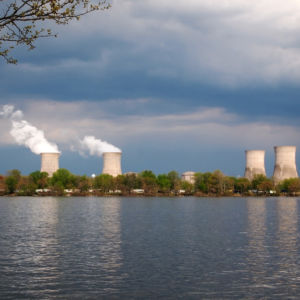It emits zero carbon, provides massive amounts of reliable electricity and is supported by the Union of Concerned Scientists. But because of the green movement’s rejection of nuclear power, it could also be out of business.
This is the concern behind a new report by the Pennsylvania General Assembly’s bipartisan Nuclear Energy Caucus (NEC) on the health of the state’s nuclear industry. Nuclear power generates more than 93 percent of Pennsylvania’s carbon-free electricity, but market pressures have pushed two reactors–Three Mile Island and Beaver Valley–to announce early closures barring some sort of state help.
“[A] short-sighted approach incentivizes states to ignore the very real implications of what is happening over the long-term, and for nuclear assets, those choices are irreversible,” the report says grimly. “Success in achieving environmental goals, economic goals, national and energy security goals, as well as consumer goals cannot be accomplished without a harmonized approach where all these vital issues are appropriately considered, and compensated for, in a market.”
“We make long-term energy policy decisions based only on what is cheap today,” it continued.
The first caucus at the state level to focus on nuclear energy, the group was founded in March, 2017 to allow state legislators to learn more about nuclear energy in Pennsylvania. Openly pro-nuclear, the caucus lists promoting the positive contributions of the nuclear industry and pushing for state recognition of nuclear’s zero carbon status as its “guiding principles.”
The situation facing Pennsylvania’s nuclear sector is one shared by the other plants operating across the country. Wholesale power prices fell from 2008 highs and have not recovered as natural gas generators continued to come on line and the demand for power has stagnated. Coal and nuclear plants, which have higher overhead costs, were especially hard hit. Meanwhile, carbon pricing schemes, which would help nuclear generators, have stalled politically.
Efforts to support “green energy” have instead focused on lawmakers’ favorite technologies, further distorting market forces.
“Some state laws pick technology winners, and usually these laws favor several zero carbon resources but not nuclear,” the report says. “This is true of Pennsylvania’s Alternative Energy Portfolio Standards Act (“AEPS”). In addition, out of market subsidies to non-nuclear technologies have had an impact on energy prices around many nuclear units.”
One of the strengths of nuclear power is its ability to provide consistent generation. It is not dependent on the wind blowing or the sun shining.
Last year’s polar vortex exemplified the need for this very well. Cold winter temperatures across large swaths of the country increased the demand for natural gas for heating as short, still winter days depressed renewable generation.
The structure of energy markets means that the benefits of cheap energy are diffused across a wide customer base while the costs–in lost tax revenue and jobs–are localized. PJM, the regional transmission company operating in Pennsylvania and 12 other states, has opposed some of these programs, even going as far as to file a brief with the Federal Energy Regulatory Commission (FERC) to implement rule changes that would have led to higher prices in states that enact clean energy policies.
New York, New Jersey, and Illinois have enacted legislation awarding zero emission tax credits. In its report, the NEC laid out the four options before the state legislature, ranging from allowing the plants to close, to setting up a state-level carbon pricing scheme, establishing a program to put nuclear power on an equal footing with other zero-carbon sources, or adopting a similar idea proposed by FERC.
For Pennsylvania, the situation is serious. Other states that chose not to act to save their nuclear plants have seen these reactors close. The nuclear plants operating in Pennsylvania account for 15,900 in-state jobs and contribute approximately $2 billion to the state’s GDP.
As in other states, Pennsylvania legislators had been waiting for direction from Washington on how to handle the problem. When FERC opted to reject reliability pricing plans proposed this summer, states realized that they needed to take action on their own.
“Pennsylvania lawmakers will have to act soon if we want to protect our consumers and the nuclear industry because policymakers and regulators in Washington D.C. have failed to address growing, long-standing flaws in energy markets,” said State Rep. Becky Corbin (R).

